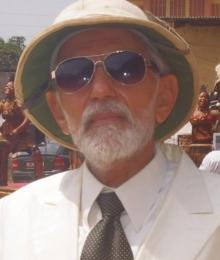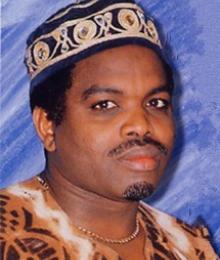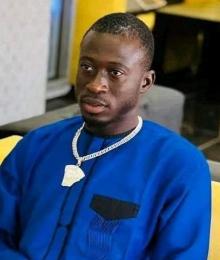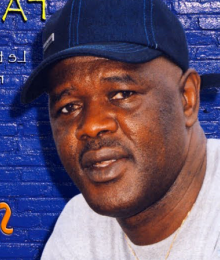
Chebly Hawil, better known as "Monsieur PINO," is an emblematic figure of Guinean theater born in 1948 in Boké. Of Lebanese origin through his father and mixed Fulani heritage through his mother, he is deeply rooted in Guinean culture despite his light complexion that often led him to play the roles of "white colonist" in his plays. Trained as a civil engineer, he first worked in the construction sector before creating his own company, ECBRE.
His theatrical career truly took off with the "Pèsè" troupe in the 1980s, notably through his memorable role in "Madègèma" (Monsieur PINO's Plantation). Having become director of the "Pèsè" troupe after the death of Alkhaly Mohamed Kéita, this multi-talented artist is also a teacher and sector chief in Ratoma, managing nearly 5,000 residents. At 76 years old, he continues to advocate for the promotion of Guinean culture and support for artists, embodying the living memory of Guinean national theater.
Introduction
Chebly Hawil, better known as "Monsieur PINO," is an emblematic figure of Guinean theater who has left his mark on the country's cultural scene. Actor, comedian, and director of the theatrical troupe "Pèsè," this multifaceted artist has won the hearts of Guineans thanks to his undeniable talent and memorable performances.
Origins and Youth
Born in 1948 in Boké, Chebly Hawil comes from a family with diverse roots. Son of the late Aly Hawil and the late Mary Kleit, a Fulani métisse, he has Lebanese origins on his father's side. On his maternal side, he is the grandson of Aissatou Barry and great-grandson of Fatoumata Binta Barry, both from Timbo. As he likes to point out: "I am of the 6th and 7th generation in the Republic of Guinea. This means I am a powerful Guinean 120 times over."
Despite his light skin, which often led him to play the roles of "white colonist" in his plays, Chebly Hawil is deeply rooted in Guinean culture. "I admit that I have white skin, but I am Guinean. The proof is that my ancestor, Aly Hawil, was a Canton Chief here in Guinea. I was born and raised here. My maternal family is 100% Guinean," he proudly affirms.
An accomplished family man, he is married and father to 12 children, 8 of whom are living (5 daughters and 3 sons).
Education and Professional Career
Young Chebly began his education at Quranic school with his grandmother before joining his father in Bouramaya-Wassou (Dubréka) to start primary school. He continued his studies at the technical college of Donka, then specialized in Civil Engineering, Building option.
His professional career initially focused on the construction sector. He worked for several private companies, notably SOGUICO (Guinean Construction Company) and Raoul Follereau Construction Company. During these years, he participated in establishing numerous infrastructures such as schools and health centers.
After joining the civil service for five years at the Sanoya factory, he decided to return to the private sector, which he considered more beneficial. This decision led him to create his own company called "ECBRE" (Building Construction, Renovation, and Maintenance Company).
Alongside these activities, Chebly Hawil also worked as a primary school teacher in the village of Bouramaya-Wassou for three years.
Today, in addition to his artistic activities, he is the sector head of Familia in the CBA North neighborhood in the commune of Ratoma, where he manages nearly 5,000 residents.
A Rich and Diverse Theatrical Career
Chebly Hawil's theatrical adventure began shortly after Guinea's independence. "After independence, everyone was an artist in this country," he recounts. He first evolved within the National Theater of Guinea, where he shared the stage with many talents such as Mory Condé, the late Marcelin Bangoura, Sam, Roda Fawaz, and Doctor Lakiss.
One of his first significant experiences was his participation in the play entitled "Thiaroye" or "The Bloody Dawn," a work by the Dabola Federation that was awarded at festivals in Conakry and replayed at the Lagos festival with the National Theater. Due to his light complexion, he was always solicited to embody the roles of white colonists.
The "Pèsè" Adventure and Rise to Fame as "Monsieur PINO"
It was by chance that Chebly Hawil joined the "Pèsè" troupe, founded in the years 1984-1985 at the beginning of Guinea's second republic. Originally, the troupe was interested in his younger brother, the late Said Hawil, to play the role of a white man in their plays. The latter, not being familiar with theater, proposed his brother Chebly to the troupe's leaders.
It was through the role of "Monsieur PINO" in the play "Madègèma" (also known as "Monsieur PINO's Plantation") that Chebly Hawil truly conquered the Guinean public and was officially recruited into the "Pèsè" troupe. This role became so emblematic that the pseudonym "Monsieur PINO" eventually replaced his real name in the collective consciousness.
"Monsieur PINO's Plantation was the film that propelled me and kept me at the forefront of all stages. It's this film that made me famous, and everywhere I go, I receive the same acclaim and consideration," he recalls with emotion.
Alongside emblematic figures like the late Yakhouba Pèssè, the late Abou Nondifalai, Alkhaly Mohamed Kéita, and N'Namina Môdou, he helped pave the Guinean theatrical road with traditional visual works that depicted social facts and staged Guinea's history.
The "Pèsè" troupe experienced immense success with the Guinean public, significantly increasing the audience of the national television (RTG), which at the time broadcast only in black and white. Their collaboration with RTG gave birth to many successful films such as "Pèsè," "Lewru Dyèrè," "Nil Palawou," "Benda," and "Sodia."
Direction of the "Pèsè" Troupe and Current Challenges
After the death of Alkhaly Mohamed Kéita, Chebly Hawil was appointed director of the "Pèsè" troupe. Despite some internal tensions that may have arisen, notably with Moungame (whom he later designated as stage director), the troupe continued its activities.
However, Guinean theater faces many challenges. Chebly Hawil deplores the proliferation of foreign series that invade local television channels: "This invasion erases, destroys, and kills Guinean cinema. It's a war, a bomb dropped on Guinean cinema."
He also denounces piracy, which seriously affects the sector: "Piracy is a harmful phenomenon for our sector. We are victims, and our productions are pirated in plain sight of everyone. It is purely and simply theft and is mean-spirited on their part."
Despite these difficulties, Monsieur PINO remains optimistic and continues to believe in the future of Guinean theater. "The Pèssè troupe is not dead. It's true that we've disappeared for quite some time. We were on standby, but we have just resumed," he stated in 2016.
Legacy and Recognition
Although Chebly Hawil believes that theater has not brought him great financial returns from the state (apart from royalties he receives from BGDA), he acknowledges having gained immense popularity: "Everywhere I go, I draw crowds behind me. This actor name 'Mr. Pino' has become common and has replaced my real name. The popularity is growing through this name, and I am proud to understand that I have played an important role in the development of Guinean culture."
This recognition has reached the highest spheres of the state, as evidenced by his meeting with the President of the transition, who confided that he had been lulled by his works during his youth.
A Call for Guinean Culture
At 76 years old, Chebly Hawil continues to advocate for the valorization of Guinean culture and support for artists. "We are libraries that continue to burn in the desert. We are forgotten in this country, while Guinea saw me born, and I saw Guinea evolve," he laments.
He makes a solemn appeal to the authorities: "I pray to the head of state, General Mamady Doumbouya, and his entire Government to assist us, to help us, so that we can continue to participate in the development of Guinean culture. One should not refuse sugar because the package is ugly. And it is from old pots that sweet sauces come."
To the young generation of artists, he advises staying true to their roots: "Dressing Guinean, dancing Guinean, consuming Guinean were unshakeable virtues for Guineans of that other era. Bind yourselves to your culture, judiciously exploit what is in your hands, instead of going elsewhere to seek what does not belong to you."
Despite his advanced age, Monsieur PINO still displays good health, which he attributes to his balanced lifestyle: "At this age, I manage my eating well, I nourish myself with natural food to maintain good health. I live on fresh fish, smoked fish, and many vegetables."
An essential figure of Guinean cultural heritage, Chebly Hawil, alias Monsieur PINO, continues to embody the living memory of national theater and remains a source of inspiration for future generations of artists.






















